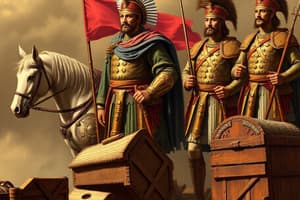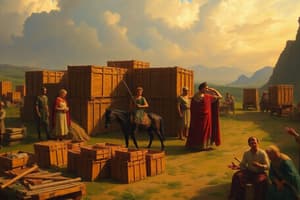Podcast
Questions and Answers
What was a significant outcome of the widespread economic expansion in the Mediterranean?
What was a significant outcome of the widespread economic expansion in the Mediterranean?
- Fragmentation of political entities.
- Increased cultural isolation.
- Decreased military advancements.
- Greater power for women. (correct)
Which major successor state to Alexander the Great was the largest?
Which major successor state to Alexander the Great was the largest?
- Ptolemaic Egypt
- Seleucid Empire (correct)
- Macedonia (Antigonids)
- Kingdom of Berenice
What was one of the cultural achievements from the time of the Ptolemaic rule in Egypt?
What was one of the cultural achievements from the time of the Ptolemaic rule in Egypt?
- Creation of the Rosetta Stone (correct)
- Development of Hellenistic city-states
- Formation of the Roman Senate
- Transition of power to the Egyptian nobles
How were military and technological advancements characterized during the Hellenistic period?
How were military and technological advancements characterized during the Hellenistic period?
What aspect of governance characterized the Seleucid, Antigonid, and Ptolemaic rule?
What aspect of governance characterized the Seleucid, Antigonid, and Ptolemaic rule?
Which city served as the main leader in the centralized state of Egypt during the Hellenistic period?
Which city served as the main leader in the centralized state of Egypt during the Hellenistic period?
What was a key outcome of the fragmentation of Macedonia after Alexander's death?
What was a key outcome of the fragmentation of Macedonia after Alexander's death?
Which of the following accurately describes the interaction of cultures during the Hellenistic period?
Which of the following accurately describes the interaction of cultures during the Hellenistic period?
What was a significant factor that supported Alexander's military campaigns?
What was a significant factor that supported Alexander's military campaigns?
At which battle did Alexander first defeat the Persian army?
At which battle did Alexander first defeat the Persian army?
Which military formation is associated with Alexander's infantry?
Which military formation is associated with Alexander's infantry?
How did Alexander's rule impact the economic landscape of the Mediterranean?
How did Alexander's rule impact the economic landscape of the Mediterranean?
Who was Alexander's father, and what impact did he have on Macedonia?
Who was Alexander's father, and what impact did he have on Macedonia?
What was a consequence of Alexander's conquests regarding Persian culture?
What was a consequence of Alexander's conquests regarding Persian culture?
What was the size of Darius III's forces at the time of the Gaugamela battle?
What was the size of Darius III's forces at the time of the Gaugamela battle?
What was a long-term result of Alexander's military campaigns after his death?
What was a long-term result of Alexander's military campaigns after his death?
Flashcards
Alexander the Great's Campaigns
Alexander the Great's Campaigns
Alexander the Great's military conquests, primarily of the Persian Empire, starting in 334 BCE.
Macedonian Military
Macedonian Military
Highly mobile and specialized armed forces, using advanced military technologies developed during the Greek city-states' wars (4th-5th centuries BCE).
Persian Army's Size
Persian Army's Size
Darius III commanded hundreds of thousands of troops, totaling around a million infantry, 40,000 cavalry, 200 scythed chariots, and 15 war elephants.
Alexander's Success over Persia
Alexander's Success over Persia
Signup and view all the flashcards
Alexander's Motivations
Alexander's Motivations
Signup and view all the flashcards
Alexander's Impact on Wealth
Alexander's Impact on Wealth
Signup and view all the flashcards
Alexander's Legacy
Alexander's Legacy
Signup and view all the flashcards
Phalanx
Phalanx
Signup and view all the flashcards
Hellenistic World
Hellenistic World
Signup and view all the flashcards
Alexander's Successors
Alexander's Successors
Signup and view all the flashcards
Seleucid Empire
Seleucid Empire
Signup and view all the flashcards
Ptolemaic Kingdom
Ptolemaic Kingdom
Signup and view all the flashcards
Rosetta Stone
Rosetta Stone
Signup and view all the flashcards
Hellenistic Culture
Hellenistic Culture
Signup and view all the flashcards
Mauryan Empire
Mauryan Empire
Signup and view all the flashcards
Aftermath of Alexander's Death
Aftermath of Alexander's Death
Signup and view all the flashcards
Women's Power in Hellenistic Kingdoms
Women's Power in Hellenistic Kingdoms
Signup and view all the flashcards
Study Notes
Alexander the Great's Campaigns and Conquests
- Born in Macedonia, died in Babylon
- Commanded highly mobile, specialized armed forces with advanced military technologies, developed during Greek city-state warfare (4th-5th century BCE)
- Father was King Philip II; unified Macedonia (~350-336 BCE) and neighboring states
- Macedonia became a large, ethnically and geographically diverse state
- Troops supported by gold mines and slave trade
- Military tactics included phalanxes (infantry in close units) and large cavalry formations
- Conquered Greek city-states (Athens) in the early 330s BCE
- Conquered Persia after inheriting his father's war (with Darius III), avenging the invasion of Thrace
- Mother Olympias rumored to have eliminated rivals to assure his succession
- Showed interest in Greek culture (Achilles, Hercules, Dionysus)
Conquest of Persia
- Defeated Persia in 334 BCE (Anatolia/Turkey, Granicus River) and 333 BCE (Issus)
- Conquered Persia in 331 BCE (Gaugamela/Iraq)
- Persia's massive army (1 million infantry, 40,000 cavalry, 200 scythed chariots, 15 war elephants), opposed by Alexander’s superior technique and resourcefulness
- Persian financial resources were vast.
- Alexander’s troops were outnumbered
Aftermath of Persian Conquest
- Alexander's conquests did not lead to an organized empire, as he died before establishing institutions to unify his lands
- Military campaigns after his death aimed to unite Afro-Eurasia's eastern and western territories
- Adopted Persian customs, marrying Persian women
- Exposed Mediterranean commodities and ideas to new regions
- Seized Persian wealth, redistributing it to Mediterranean economies, leading to economic expansion
- Founded 11 cities named after himself
Impacts of Alexander's Conquests
- Expanded Macedonia
- Defeated Persia
- Thousands died in battles
- United eastern and western Afro-Eurasia
- Widespread economic growth in the Mediterranean
- Women gained greater power due to male deaths and leadership
- Military and technological advancements
- Spread of Hellenistic culture
- Silk Road development (indirectly)
- Influence on the Mauryan Empire
- Built garrison towns turning into Hellenistic centers
- Influence on Buddha sculpture's realism
Aftermath of Alexander's Death
- Macedonia fragmented, generals fought for control
- Alexander's successors (Seleucus, Antigonus, Ptolemy, Lysimachus) became absolute rulers of large territories
- Women held greater power in leadership roles.
- Example: Berenice I of Egypt (320-280 BCE)
Hellenistic World
- World shaped by Alexander's conquests.
- Three major successor kingdoms emerged:
- Seleucid Empire (Seleucus): Largest, encompassing much of old Persia; based in Mesopotamia
- Macedonia (Antigonids): Smallest; Alexander's homeland
- Egypt (Ptolemy): Longest-lasting kingdom, lasting for 275 years
- Merged kingship and priestly power with Hellenistic culture
- Rosetta Stone (196 BCE) exemplified this cultural merger; recording Ptolemy V's relationship to Egyptian temples and priesthood using three scripts
Ptolemaic Egypt
- Ptolemaic rulers united Upper and Lower Egypt into a centralized state, centered in Alexandria
- Avoided sharing power with Egyptian nobles; married within royal family
- Committed to Greek language and culture; famous example, Cleopatra VII
- Mainland Greek city-states were now part of larger territories
Hellenistic Culture
- Unification spread common Hellenistic culture across vast territories (Greece, Mediterranean, Sub-Saharan Africa, Southwest Asia, Iranian Plateau, Central and South Asia)
- Hellenism: shared Greek culture encompassing the Mediterranean
Studying That Suits You
Use AI to generate personalized quizzes and flashcards to suit your learning preferences.




